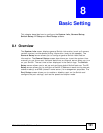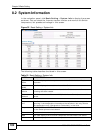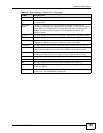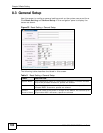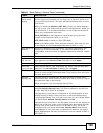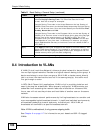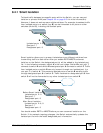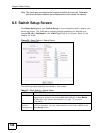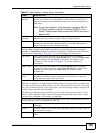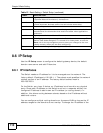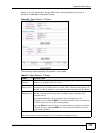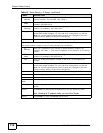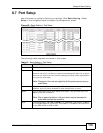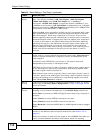
Chapter 8 Basic Setting
XGS-4526/4528F/4728F User’s Guide
109
Smart
Isolation
Select Active to enable smart isolation on the Switch. The designated
port(s) then becomes the isolated port. Smart isolation allows you to
prevent isolated ports on different switches from transmitting traffic to
each other.
Note: To use smart isolation, you should have configured 802.1Q
VLAN port isolation or private VLAN and (M)RSTP on the
Switch. Smart isolation does not work with MSTP and/or port-
based VLAN.
MAC Address
Learning
MAC address learning reduces outgoing traffic broadcasts. For MAC
address learning to occur on a port, the port must be active.
Aging Time Enter a time from 10 to 1000000 seconds. This is how long all
dynamically learned MAC addresses remain in the MAC address table
before they age out (and must be relearned).
GARP Timer: Switches join VLANs by making a declaration. A declaration is made by
issuing a Join message using GARP. Declarations are withdrawn by issuing a Leave
message. A Leave All message terminates all registrations. GARP timers set declaration
timeout values. See Chapter 9 on page 117 for more background information.
Join Timer Join Timer sets the duration of the Join Period timer for GVRP in
milliseconds. Each port has a Join Period timer. The allowed Join Time
range is between 100 and 65535 milliseconds; the default is 200
milliseconds. See Chapter 9 on page 117 for more background
information.
Leave Timer Leave Time sets the duration of the Leave Period timer for GVRP in
milliseconds. Each port has a single Leave Period timer. Leave Time
must be two times larger than Join Timer; the default is 600
milliseconds.
Leave All
Timer
Leave All Timer sets the duration of the Leave All Period timer for GVRP in
milliseconds. Each port has a single Leave All Period timer. Leave All
Timer must be larger than Leave Timer.
Priority Queue Assignment
IEEE 802.1p defines up to eight separate traffic types by inserting a tag into a MAC-layer
frame that contains bits to define class of service. Frames without an explicit priority tag
are given the default priority of the ingress port. Use the following fields to configure the
priority level-to-physical queue mapping.
The Switch has eight physical queues that you can map to the 8 priority levels. On the
Switch, traffic assigned to higher index queues gets through faster while traffic in lower
index queues is dropped if the network is congested.
Priority Level (The following descriptions are based on the traffic types defined in the IEEE
802.1d standard (which incorporates the 802.1p).
Level 7 Typically used for network control traffic such as router configuration
messages.
Level 6 Typically used for voice traffic that is especially sensitive to jitter (jitter is
the variations in delay).
Level 5 Typically used for video that consumes high bandwidth and is sensitive to
jitter.
Table 12 Basic Setting > Switch Setup (continued)
LABEL DESCRIPTION



